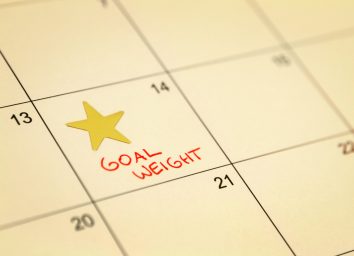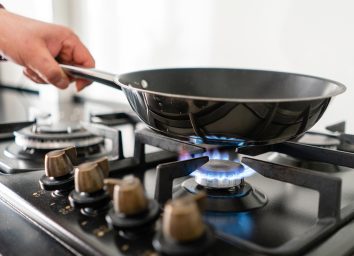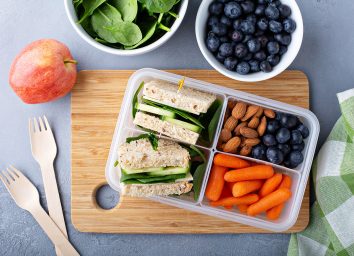27 Worst Eating Habits for Your Waistline, According to Science
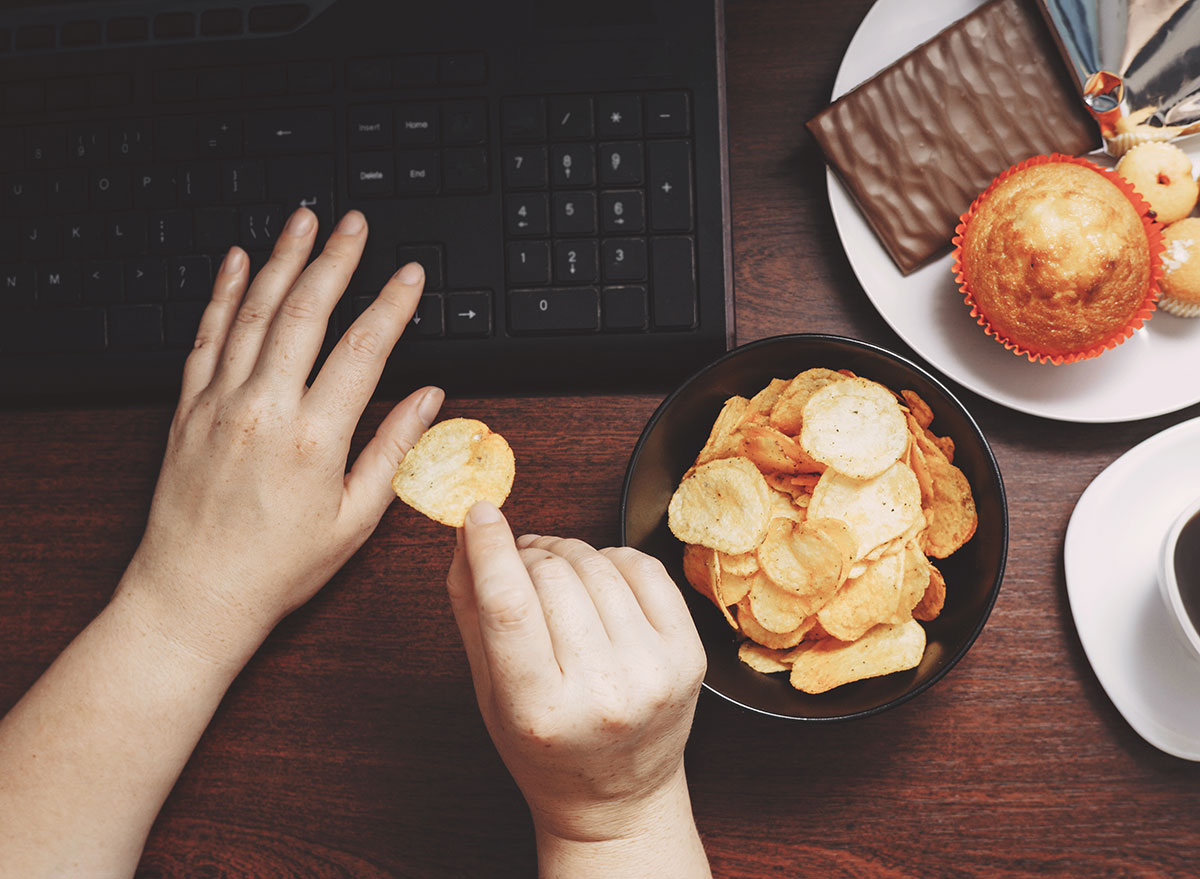
It’s not just what you’re eating that can cause weight gain but also how you’re eating it. By that, we mean that your eating habits—you know, the things that are so ingrained into our routines that we barely notice we’re doing them—play just as much of a role in your weight maintenance as the not-so-great foods you might be eating.
And that’s great news because if you can identify those unhealthy eating habits, you can completely change the course of your health for the better. Tweak just a few of these unhealthiest eating habits every day and you could be on your way to a flatter belly in no time! While you’re at it, might as well stock up on these 7 Healthiest Foods to Eat Right Now.
You skip meals
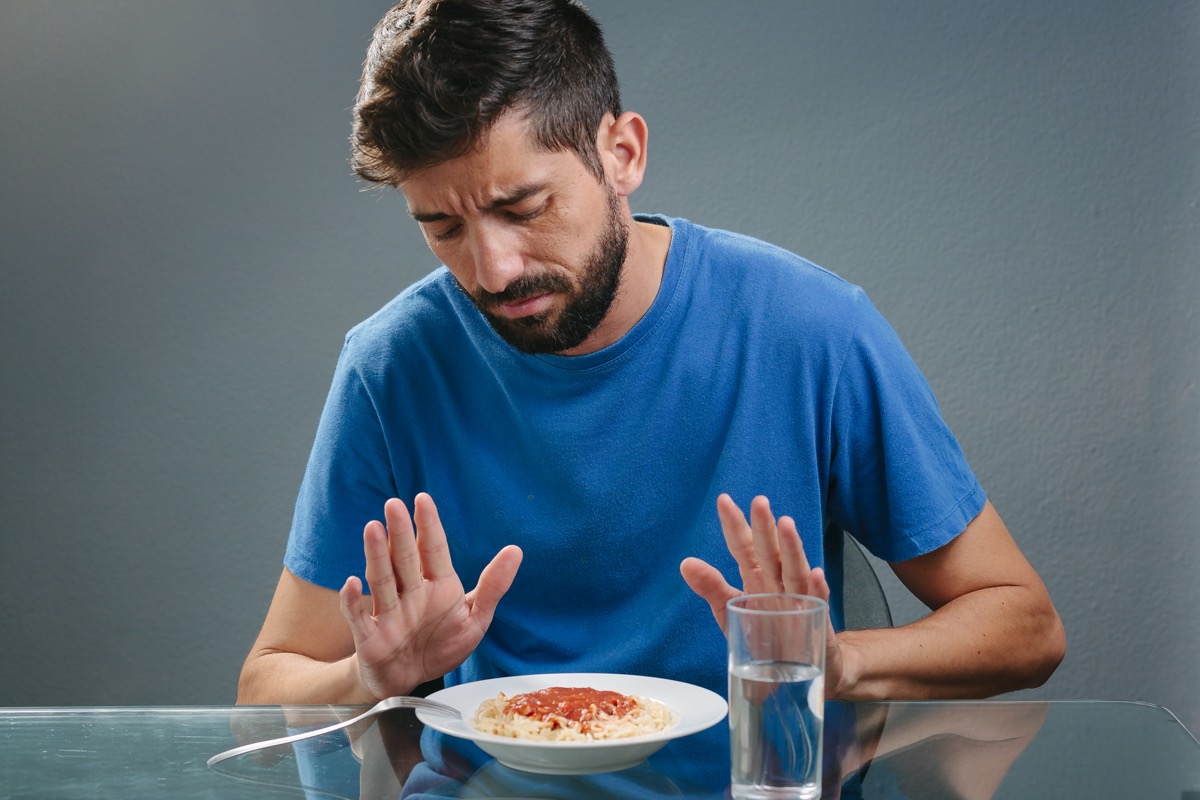
In a 2011 national survey from the Calorie Control Council, 17% of Americans admitted to skipping meals to lose weight. The problem is, skipping meals increases your odds of obesity, especially when it comes to breakfast. A study from the American Journal of Epidemiology found that people who cut out the morning meal were 4.5 times more likely to be obese. Why? Skipping meals slows your metabolism and boosts your hunger. That puts your body in prime fat-storage mode and increases your odds of overeating at the next meal. And don’t say you don’t have time for breakfast; it’s easy if you make these overnight oats!
You eat dinner after 9 p.m.
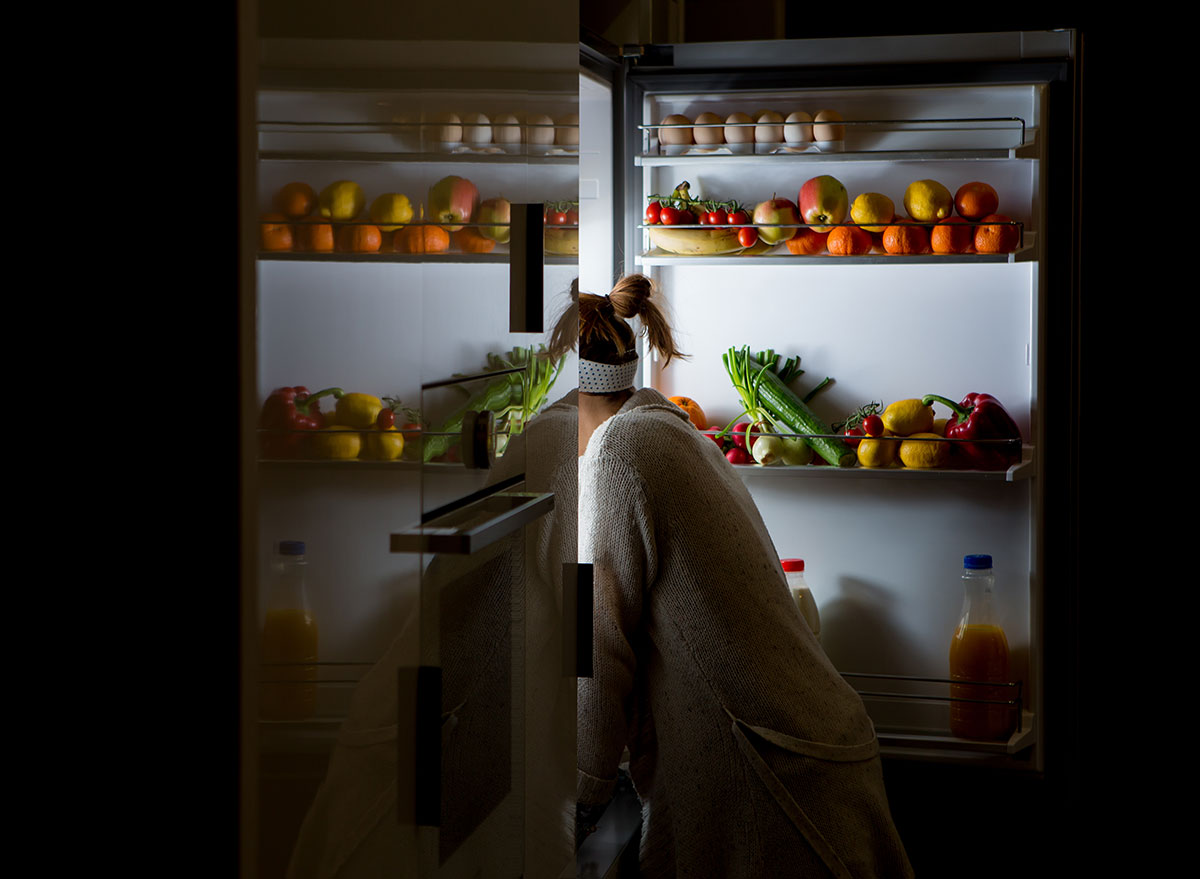
No, it’s not because your metabolism slows down after this time—that’s a common food myth. But it is true that late-night eaters are more likely to gain weight compared to those who take advantage of the early bird special, according to a study published in the journal Appetite. It’s not because they don’t burn those calories as rapidly; it’s because these night owls are more likely to binge eat (after starving themselves since lunch) and subsequently choose unhealthy foods high in sugar and fat to quickly put in their rumbling tummies. Not only will these high-energy foods pack on the pounds, but many of them can make it harder to fall asleep. And if you didn’t already know, getting enough sleep is one of the answers to how to lose 10 pounds.
You keep unhealthy food in sight
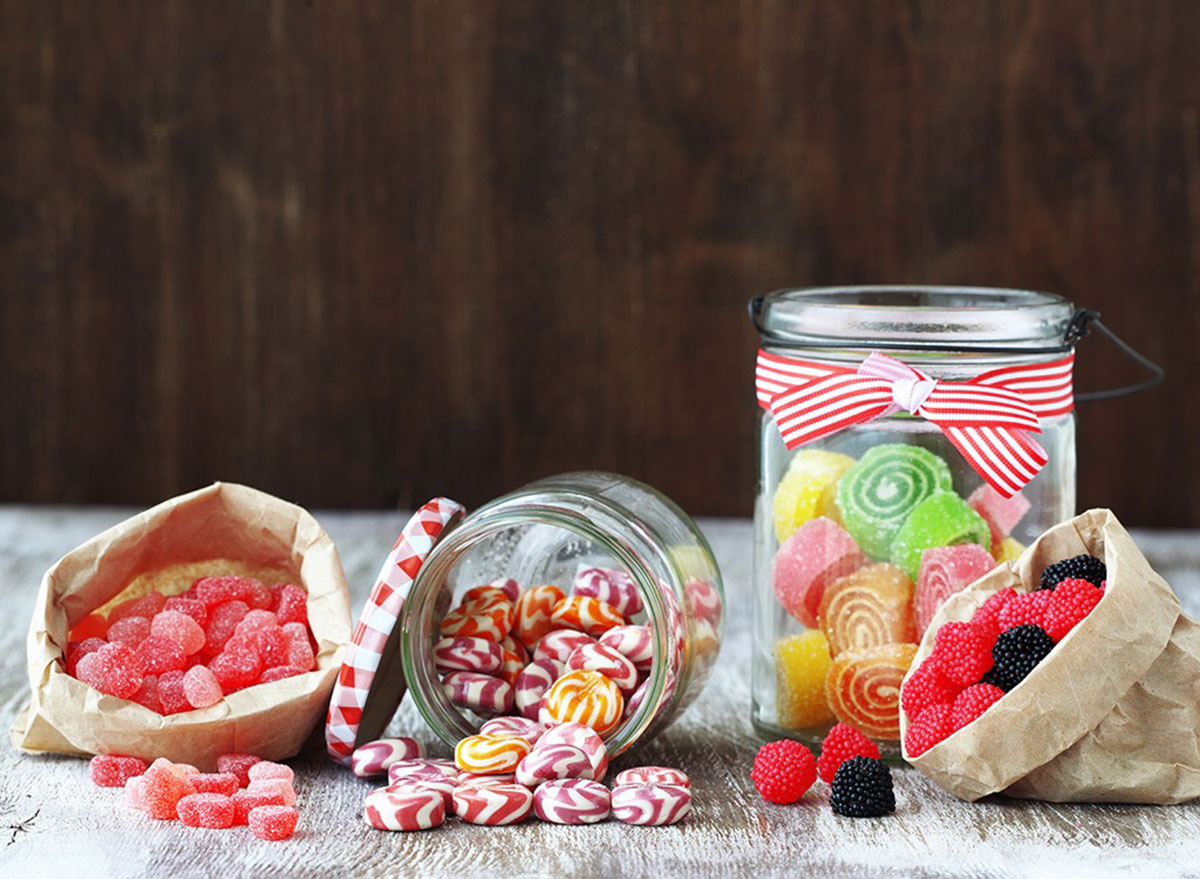
Our homes are filled with hidden eating traps, and simply being aware of something as simple as the size of a bowl can influence how much you eat. For example, a study conducted at Google’s New York office found that placing M&Ms in opaque containers as opposed to glass ones and giving healthier snacks more prominent shelf space curbed candy consumption by 3.1 million calories in just seven weeks. So what does that mean for your weight? The lesson here is clear: Clear junk food off your countertops to start losing weight and to make better choices. And here are 21 Foods to Toss Out of Your Kitchen For Good!
You eat too quickly
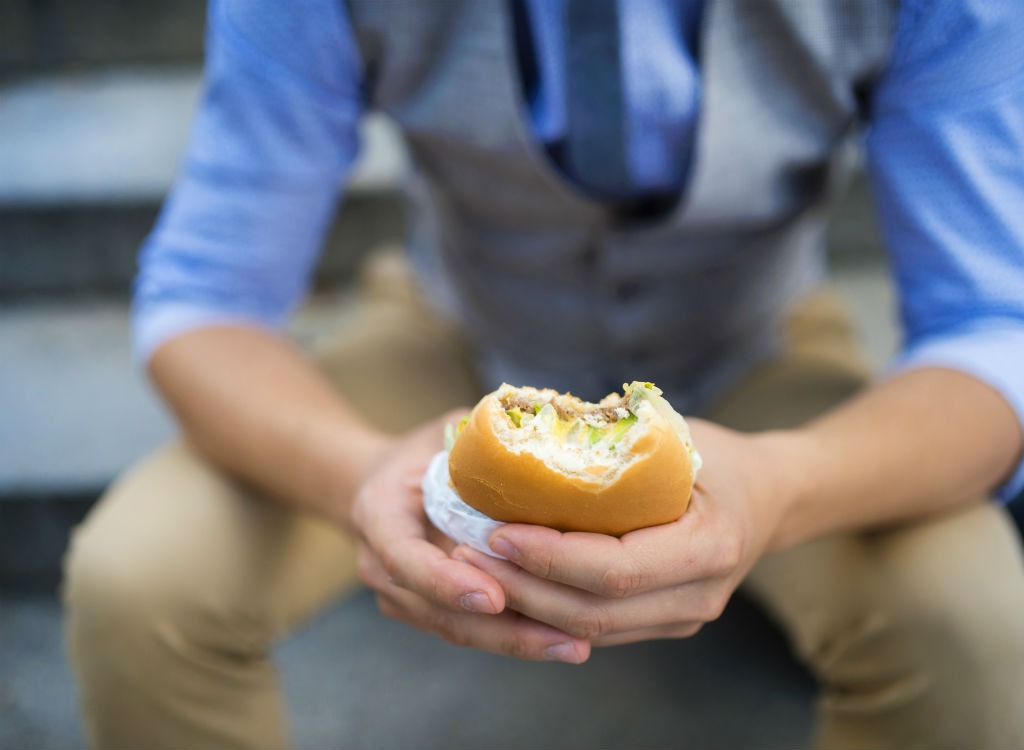
If your body has one major flaw, this is it: It takes 20 minutes for your stomach to tell your brain that it’s had enough. A study in the Journal of the American Dietetic Association found that slow eaters took in 66 fewer calories per meal, but compared to their fast-eating peers, they felt like they had eaten more. What’s 66 calories, you ask? If you can do that at every meal, you’ll lose more than 20 pounds a year!
You restrict yourself too much
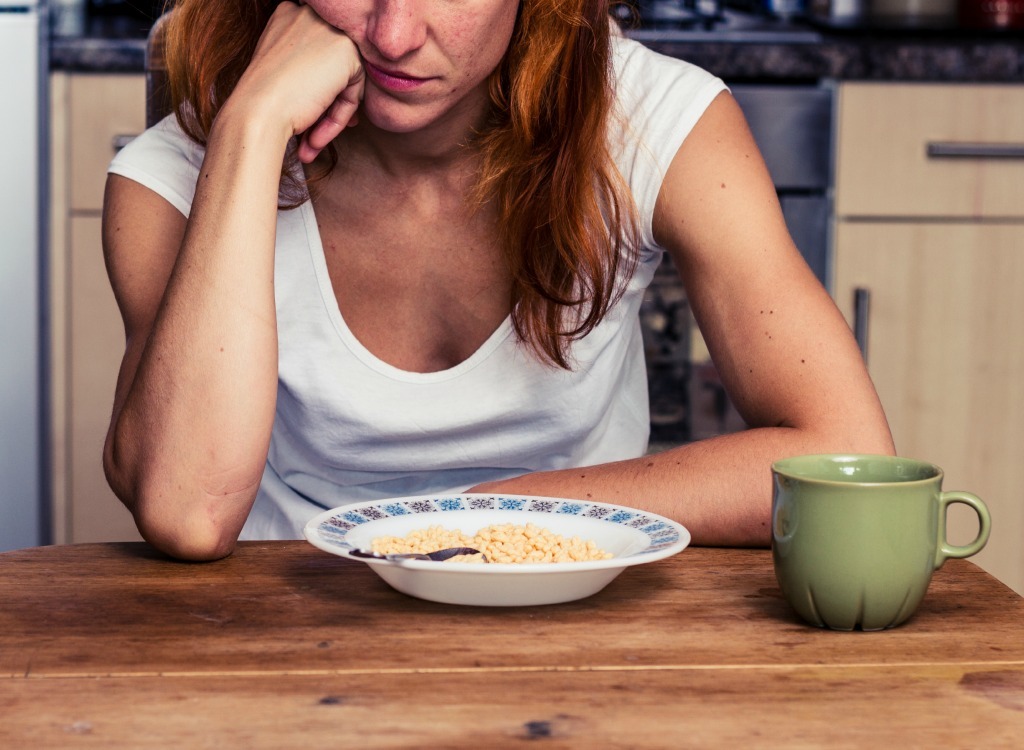
That’s a recipe for disaster. When you feel like you aren’t able to enjoy something indulgent from time to time, it can leave you with hard-to-ignore cravings. So enjoy that food you’ve been eyeing—just as long as they’re not The Cheat Meals That Are Never Worth it, According to an Expert.
You eat at your desk
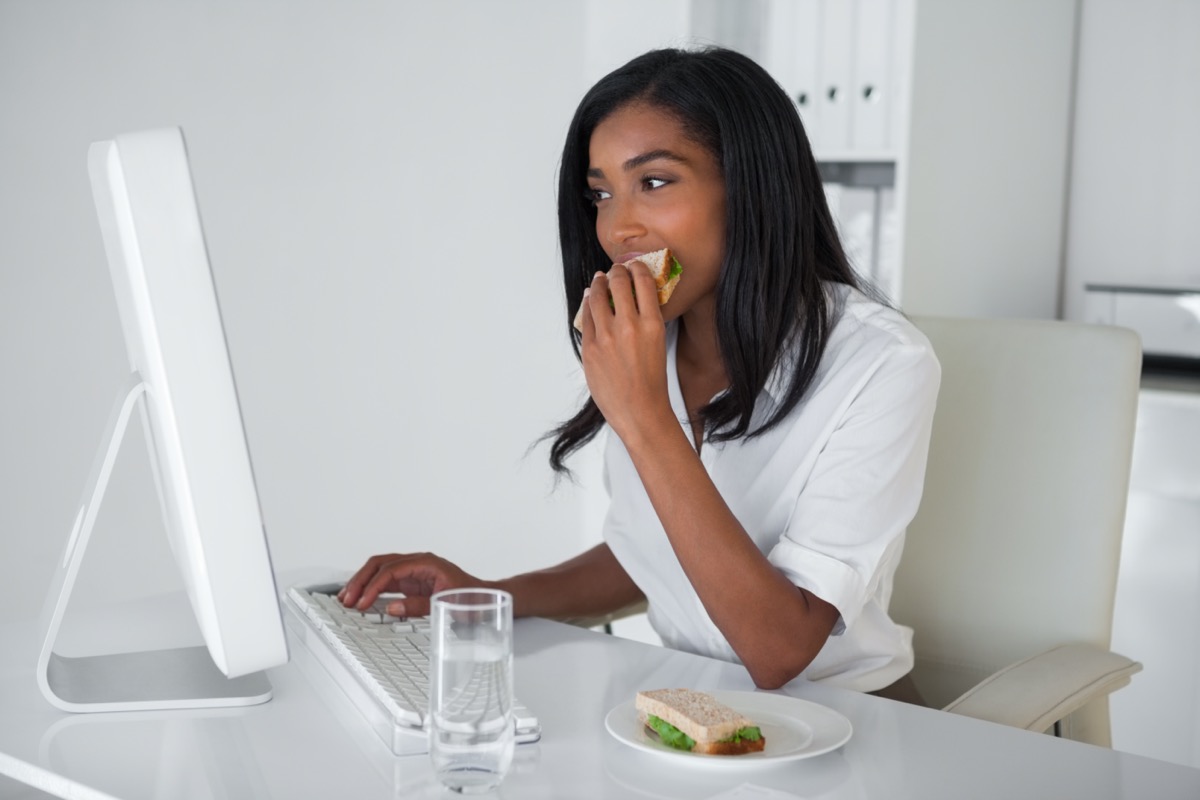
You may think it’s beneficial for your hourly pay, or to prove yourself to your boss, but eating your lunch at your desk isn’t doing your waistline any favors. And you’re not the only one doing this. According to research conducted by the NPD group, roughly 62% of working American professionals dine “al-desko.” The issue is that you’re eating distractedly, which can cause you to consume up to 50% more calories than you intended, according to a 2013 review in the American Journal of Clinical Nutrition. Instead, take a minute off from work and dine in the breakroom, at a nearby park, or even at a restaurant.
You always order the combo meal
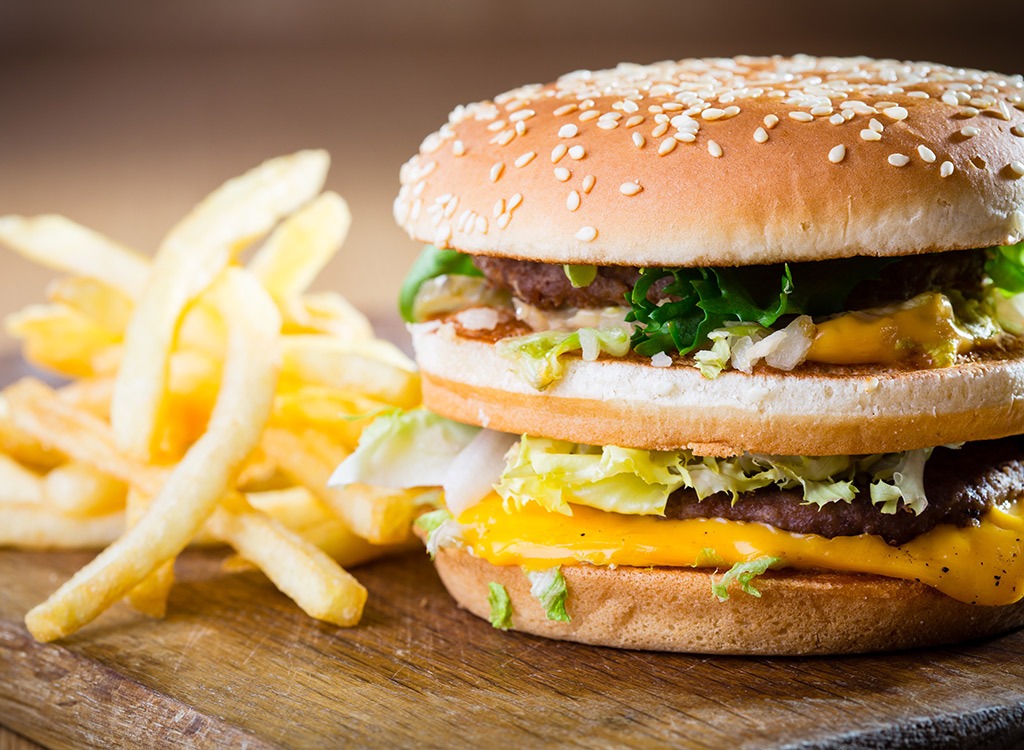
A study in the Journal of Public Policy & Marketing shows that compared to ordering a la carte, you pick up a hundred or more extra calories by opting for the “combo” or “value meal.” Why? Because when you order items bundled together, you’re likely to buy more food than you want. You’re better off ordering your food piecemeal. That way you won’t be influenced by pricing schemes designed to hustle a few more cents out of your pocket.
You eat when you’re stressed
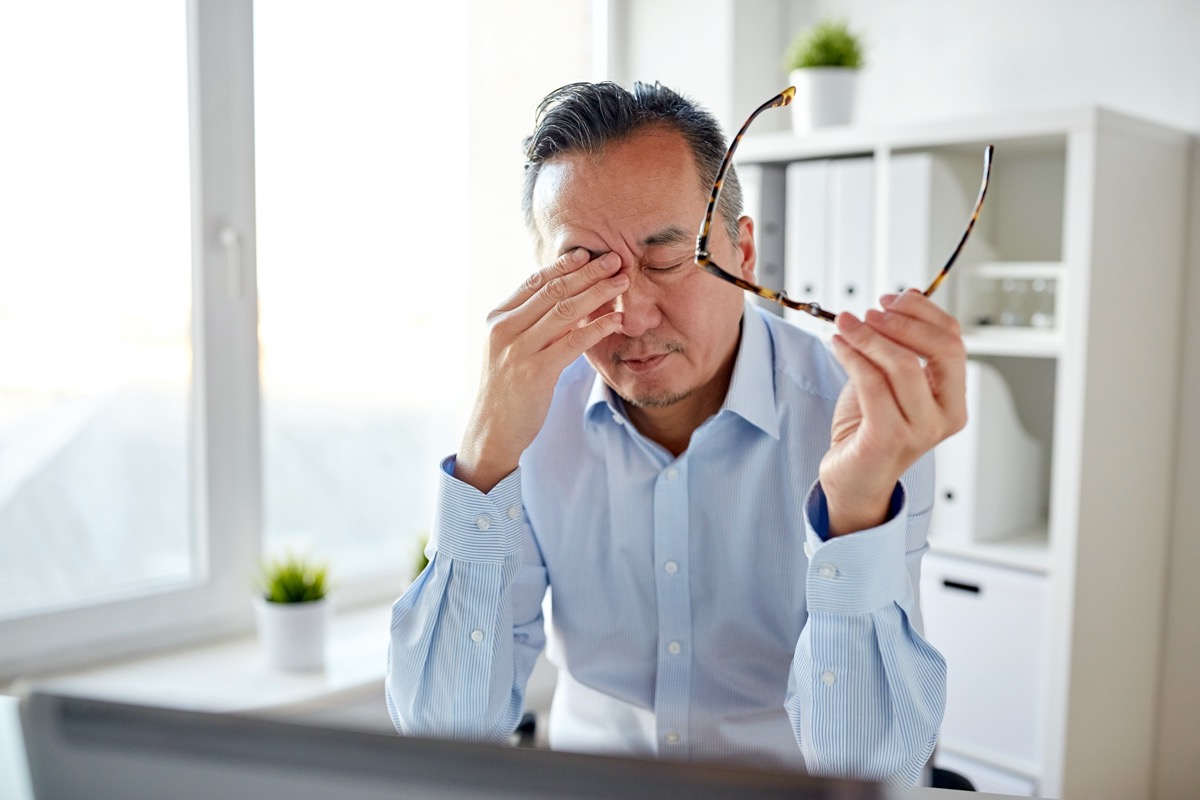
You manage to avoid the office candy bowl, which is pretty impressive—especially on super stressful days—but you’ve got to let off some steam somehow. If you don’t, it could lead to chronically elevated cortisol levels, causing sleep and immunity problems, blood sugar abnormalities, and weight gain. (Related: Are Cortisol Levels And Stress To Blame For Your Weight Gain?)
You eat while watching T.V.
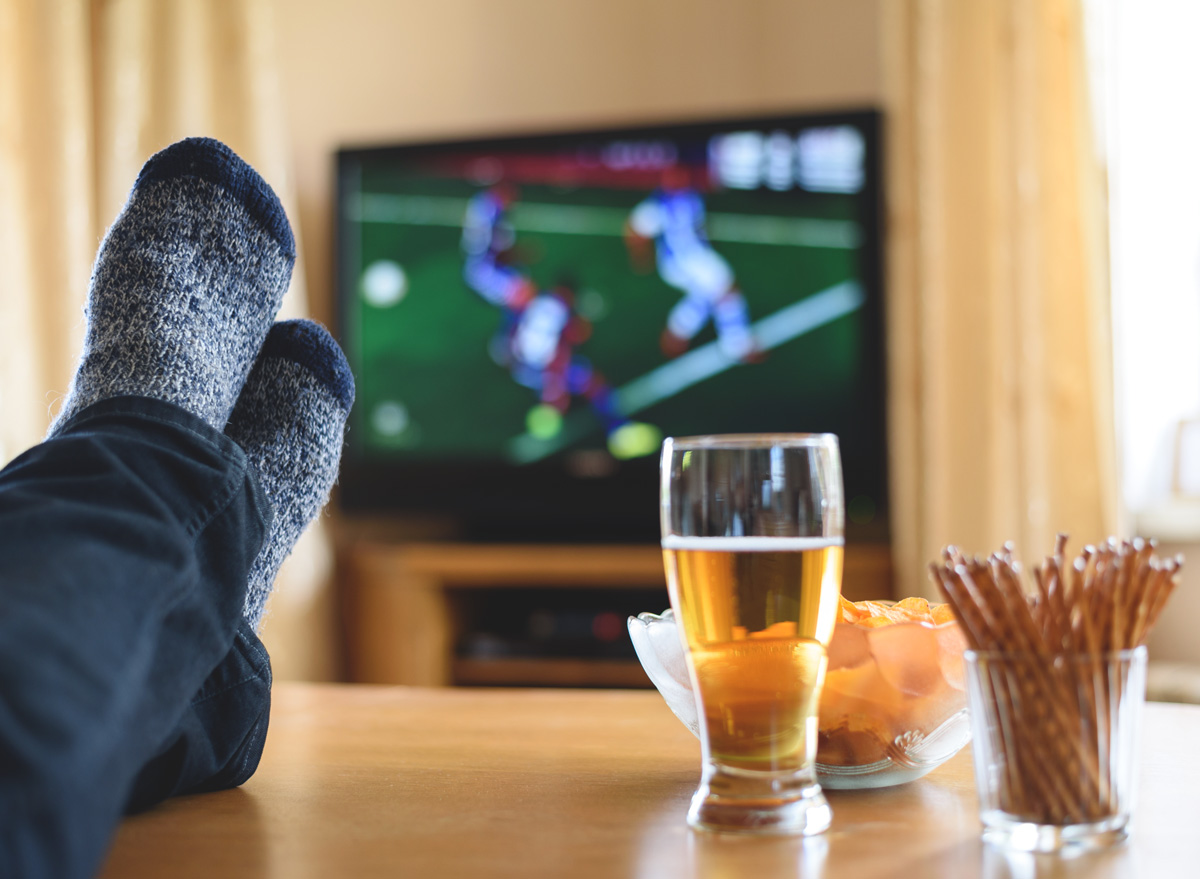
A University of Vermont study found that overweight participants who reduced their TV time by just 50% burned an additional 119 calories a day on average. That’s an automatic 12-pound annual loss! Maximize those results by multitasking while you watch—even light household tasks will further bump up your caloric burn. Plus, if your hands are occupied with dishes or laundry, you’ll be less likely to mindlessly snack—the other main occupational hazard associated with tube time.
You cut out entire food groups at a time
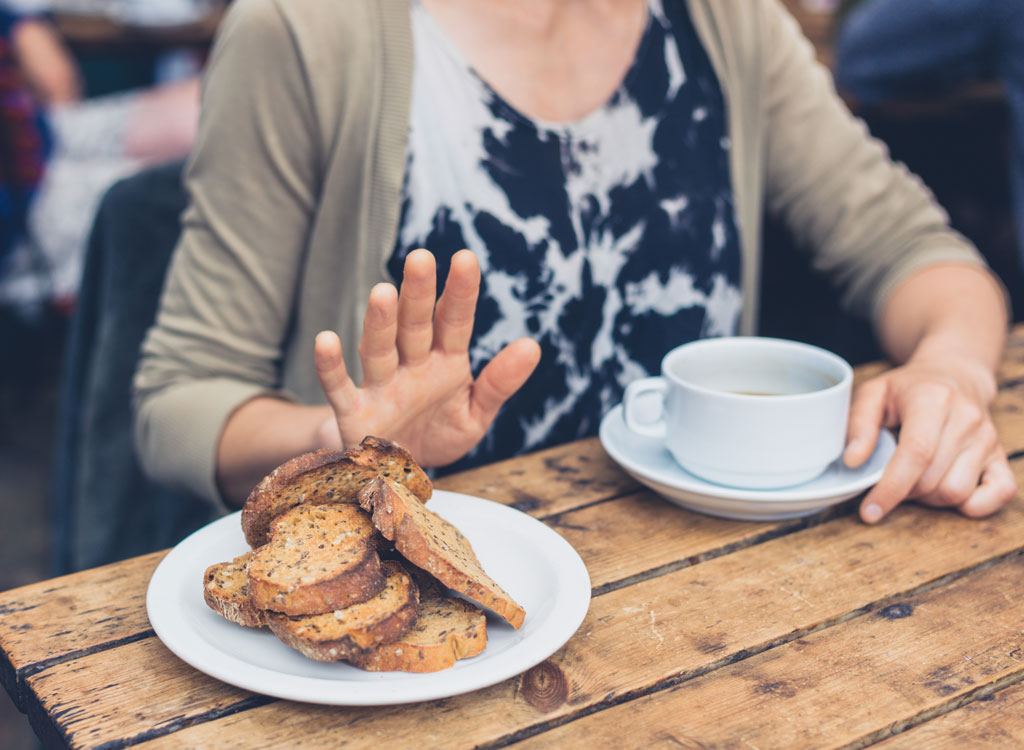
If you’ve just hopped on the Paleo or low-carb bandwagon, proceed with caution! Often diets that cut out entire food groups do not allow for the balance and moderation we need to follow a healthy, lifelong eating plan. Plus, dieters who follow these plans may be prone to potentially dangerous nutritional deficiencies. Or you may simply get bored with your restricted plan and end up overeating down the road.
You eat most of your meals out
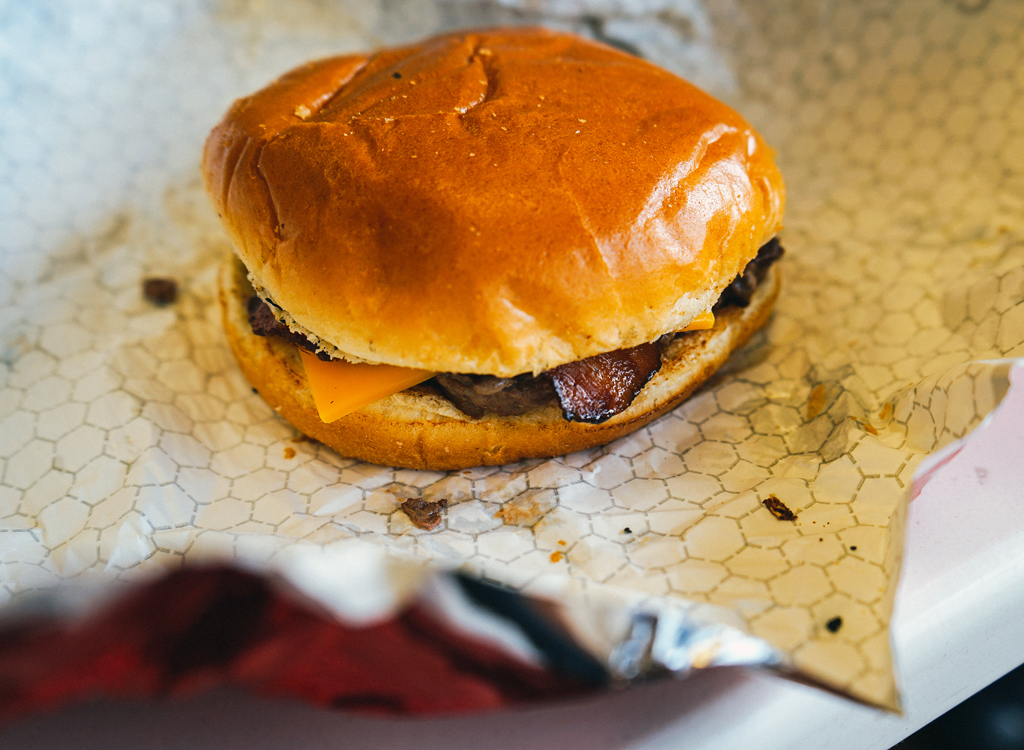
You’ll save money and calories! Countless studies show that restaurant fare is both high in calories and loaded with salt, the ingredient that causes belly bloat. Cooking your own meals can help you cut back on both of these measures. In fact, Johns Hopkins researchers found that home cooks will consume nearly 200 fewer calories than people who eat out more often. For some drool-worthy lunch ideas, check out these 25 Super-Healthy Lunches Under 400 Calories.
You stand while you eat
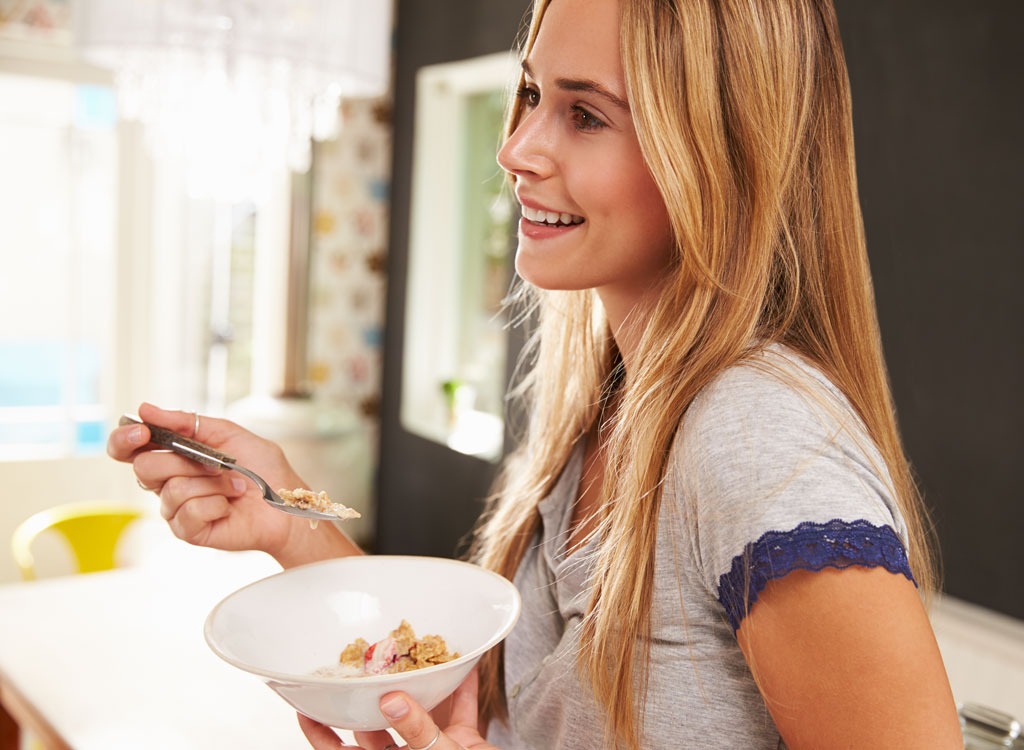
We’re all for walking meetings, just as long as they’re not lunch meetings. That’s because studies have found that people who stand while munching end up scarfing down 30% more at their next meal compared to those who sit. Researchers speculate that it’s because our body subconsciously dismisses a standing meal as a “false meal,” which causes us to eat more later in the day.
You eat off large plates
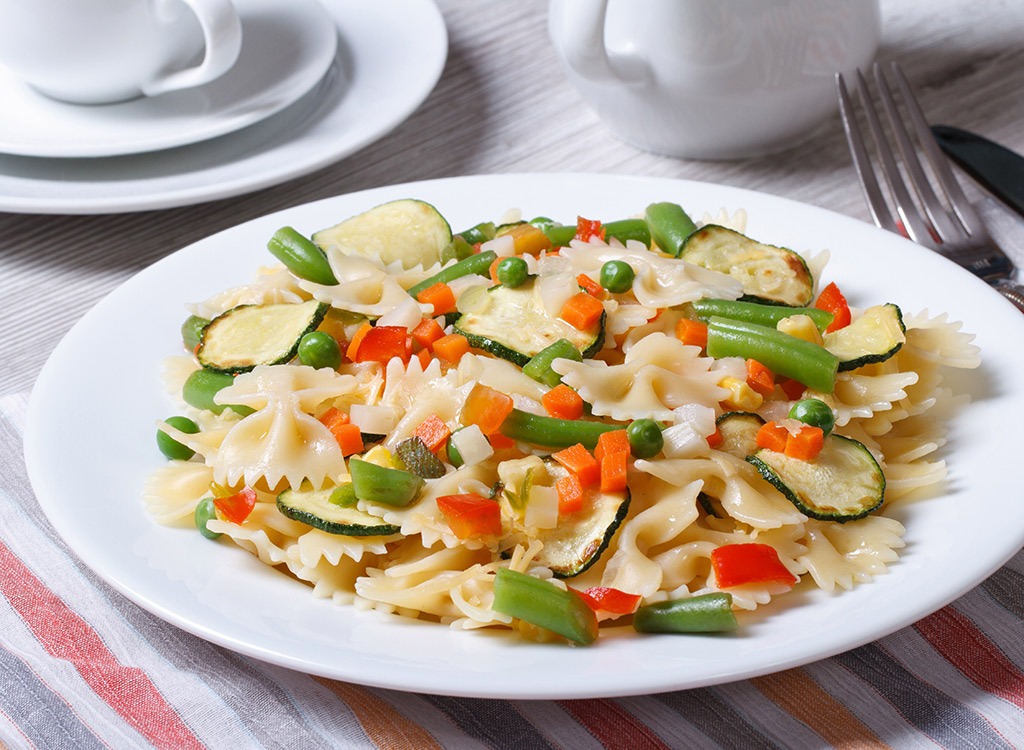
One study found that when given an option, a whopping 98.6% of obese individuals opt for larger plates. Translation: More food, more calories, and more body fat. Keep your portions in check by choosing smaller serving dishes. If need be, you can always go back for seconds.
You serve yourself from the table
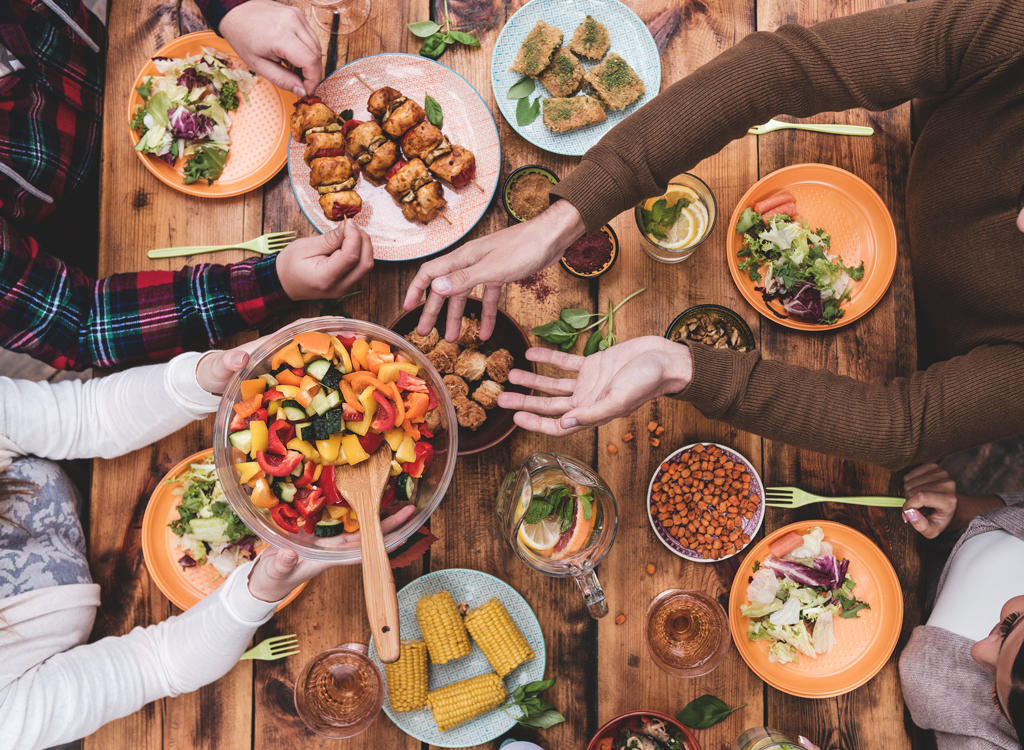
Resist setting out foods buffet- or family-style, and opt instead to serve them from the kitchen. A study in the journal Obesity found that when food is served from the dinner table, people consume 35% more over the course of the meal. When an additional helping requires leaving the table, people hesitate to go back for more.
You eat on an irregular schedule

An irregular eating schedule can undercut your metabolism. Research from John Moores University in Liverpool found that women who fluctuated between eating low- and high-calorie meals were less happy with their bodies than those whose plates contained a similar number of calories from meal to meal. But it’s not just fluctuating meal size that can derail your weight-loss goals. A Hebrew University study from 2012 found that mice that were fed high-fat foods sporadically gained more weight than mice that ate a similar diet on a regular schedule. Your move? Figure out how many calories you need to achieve your desired weight, and evenly divide that number by the three, four or five meals and snacks you eat per day. Aim for each of your meals to be roughly that size and eat them at about the same time each day. For more metabolism-boosting tips, check out these 55 Best Ways to Boost Your Metabolism!
You always polish off your plate
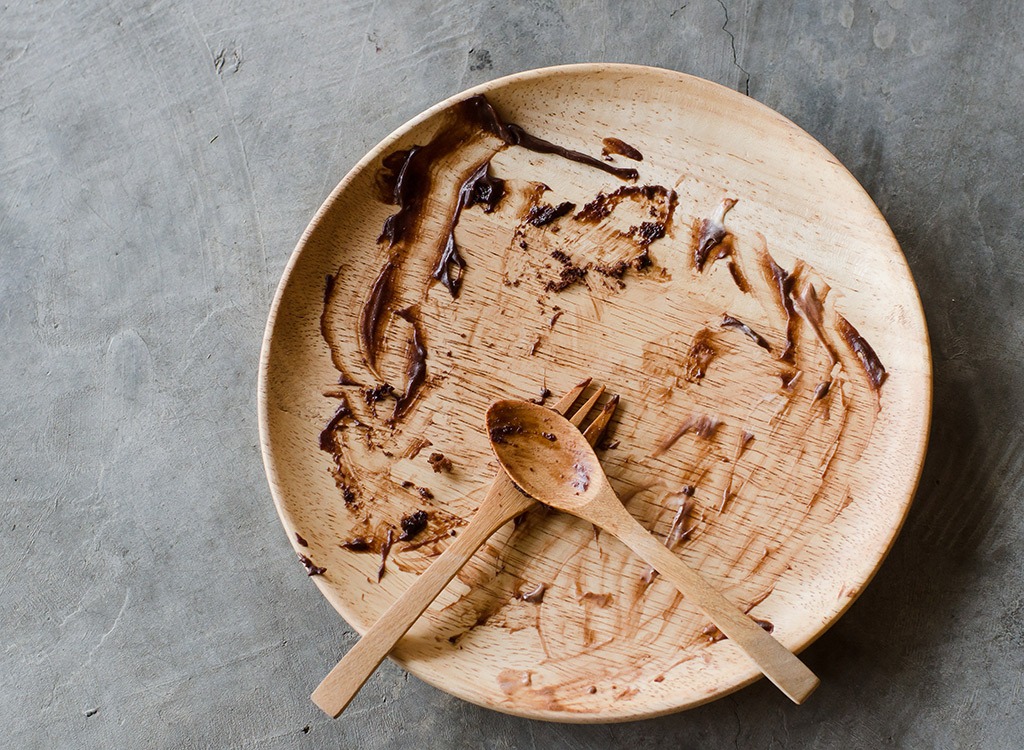
And you don’t necessarily need to. Eat until you’re 80% full, then stop. In Japan, this method is called hara hachi bun me, which roughly translates to “eat until you are eight parts (out of ten) full. Remember, you can always eat a high-protein snack later. Make it one of these 25 Best High-Protein Snacks in America!
You eat whenever you’re emotional

A study from the University of Alabama found that emotional eaters—those who admitted eating in response to emotional stress—were 13 times more likely to be overweight or obese. If you feel the urge to eat in response to stress, try chewing a piece of gum, chugging a glass of water, or taking a walk around the block. Create an automatic response that doesn’t involve food and you’ll prevent yourself from overloading on calories.
You eat free restaurant food
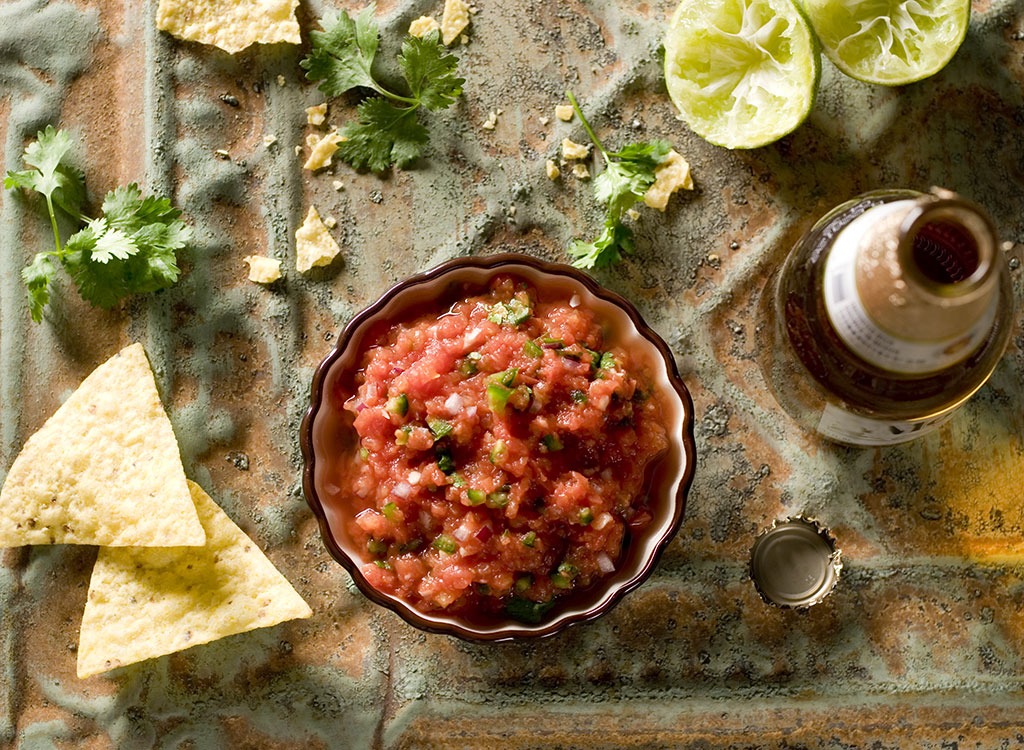
Breadsticks, biscuits, and chips and salsa may be complimentary at some restaurants, but that doesn’t mean you won’t pay for them. Every time you eat one of Olive Garden’s free breadsticks or Red Lobster’s Cheddar Bay Biscuits, you’re adding an additional 150 calories to your meal. Eat three throughout dinner and that’s 450 calories. That’s also roughly the number of calories you can expect for every basket of tortilla chips you get at your local Mexican restaurant. What’s worse, none of these calories comes paired with any redeeming nutritional value. Consider them junk food on steroids.
You order lunch when you’re hungry
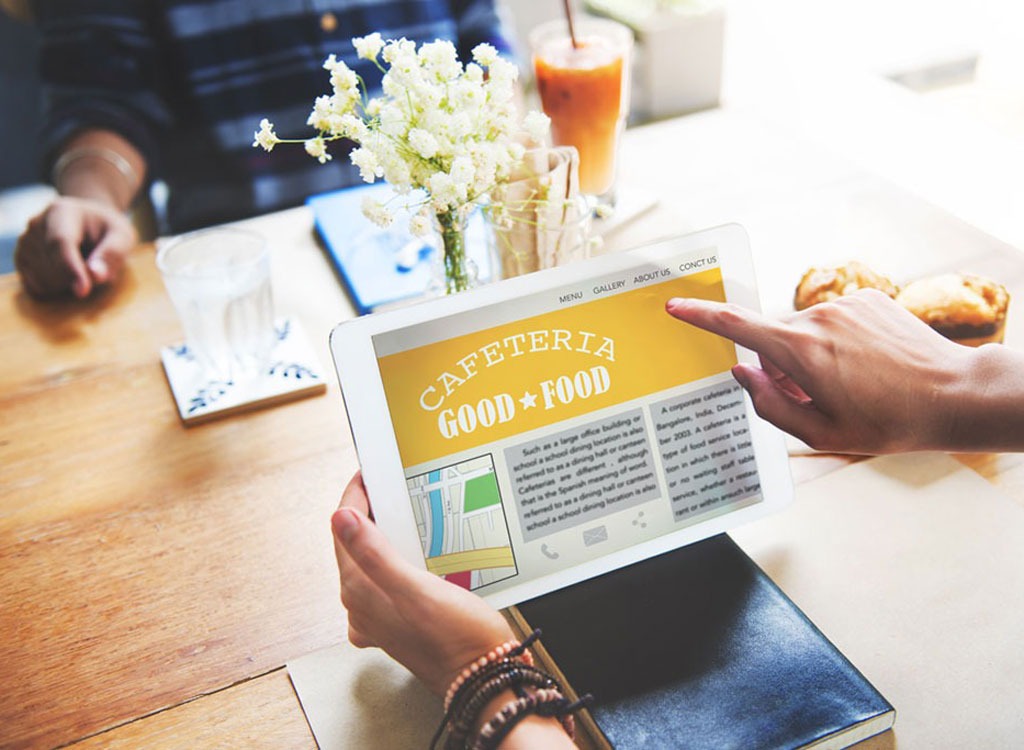
When it’s time to order out, here’s our advice: order ahead of time. Like, right after you get in the office. Researchers from the University of Pennsylvania and Carnegie Mellon University found that when people ordered lunch more than an hour before eating, dieters chose meals with an average of 109 fewer calories than those who ordered immediately before lunch. The reasoning behind the saved calories? Your willpower to choose healthy meals rapidly deteriorates when your mind is distracted by a rumbling stomach that craves energy-dense food. Talk about being hangry.
You eat in your bedroom
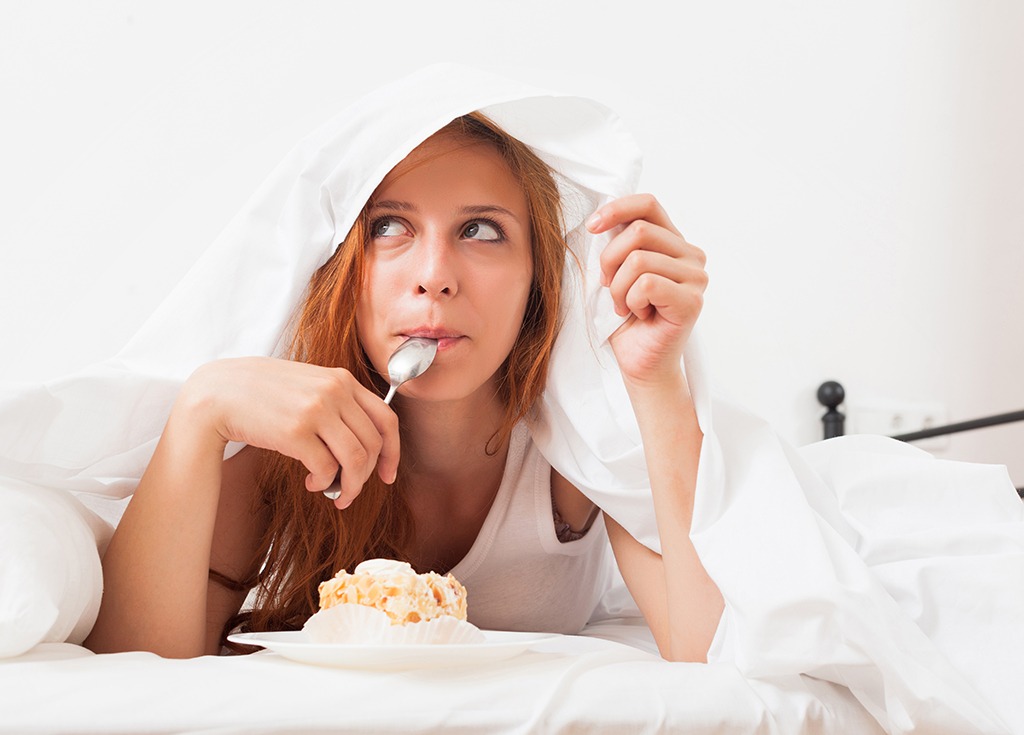
An analysis published in the journal Sleep Medicine found that keeping a television in the bedroom was associated with shorter total sleep time. It’s not just TV that will prevent you from getting a restorative night’s sleep (which, if you didn’t already know, is one of the essential rules for weight loss); it’s also noshing in bed. When you reserve your bedroom for snoozing, you can train your brain and body to associate slipping under the covers with sleep—making it much easier to catch some ZZZ’s.
You drink most of your calories

Yes, this bad eating habit goes for everything from sodas and alcohol to juice cleanses and bottled teas. That’s because beverages often lack healthy fats and fiber: two satiating nutrients that keep hunger pangs at bay. A study published in the American Journal of Clinical Nutrition found that participants ended up drinking more (and thus consumed a greater number of calories) until they felt satisfied, compared to when they ate solid food.
There are several factors at play when it comes to satiety, and experts believe that both the sound and the physical act of chewing helps monitor your consumption; they think chewing will even increase satiety better than slurping. So, take a cue from a recent study published in the same journal—which found that thick smoothies made people feel fuller than a thin drink with the same amount of calories—by adding in a generous scoop of Greek yogurt and a sprinkling of crunchy nuts to your protein shakes in the mornings.
You eat whatever food you can find
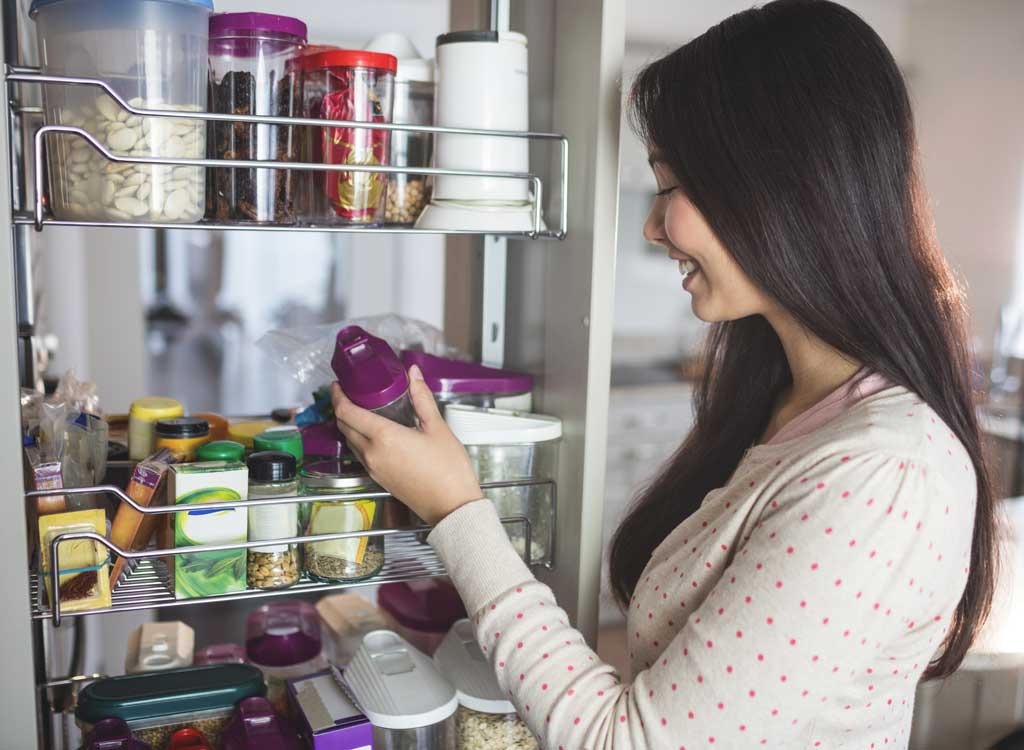
Keeping healthy snacks on hand at all times makes it hard to fail. Without them, your ravenous self will likely dig into whatever high-calorie food you can get your hands on. Cut up veggies and store them in the fridge to dip into hummus, keep fruit in a bowl on a counter near your keys, and stock up on an assortment of nuts. Looking for more ideas? Check out these high protein snacks.
You eat when you aren’t hungry
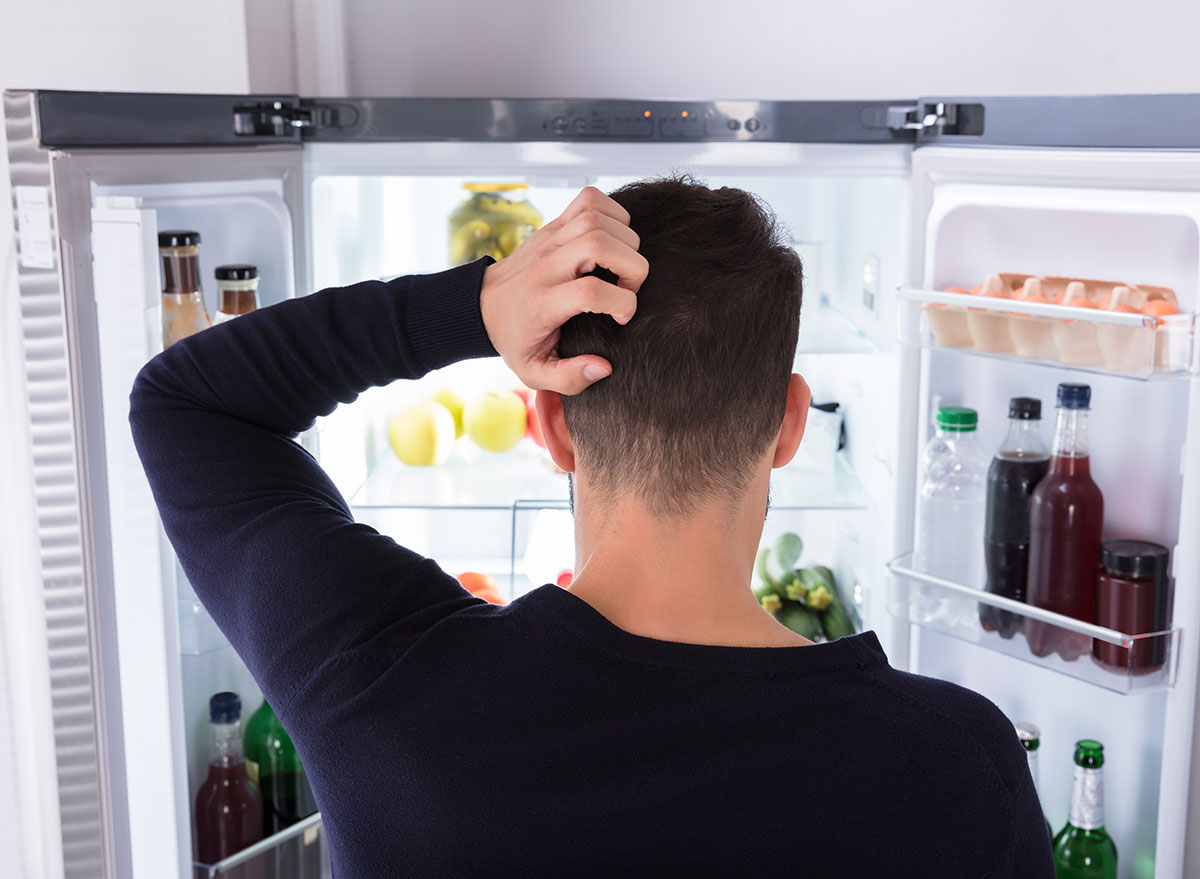
Just because you’re going to see a movie doesn’t mean you need to buy an extra-large popcorn. The same goes for that leftover food from the morning meeting that’s been placed in the breakroom. Just because it’s free—or because you’re bored—doesn’t mean you should eat. Whenever you see food that’s tempting you, ask yourself, “Am I actually hungry?” Test yourself by knocking back a cup of water and waiting 10 minutes. Around 60% of the time, people inappropriately respond to thirst by eating instead of drinking, according to a Physiology & Behavior study. It’s one of the reasons you’re always hungry.
You’re always trying to cook something new
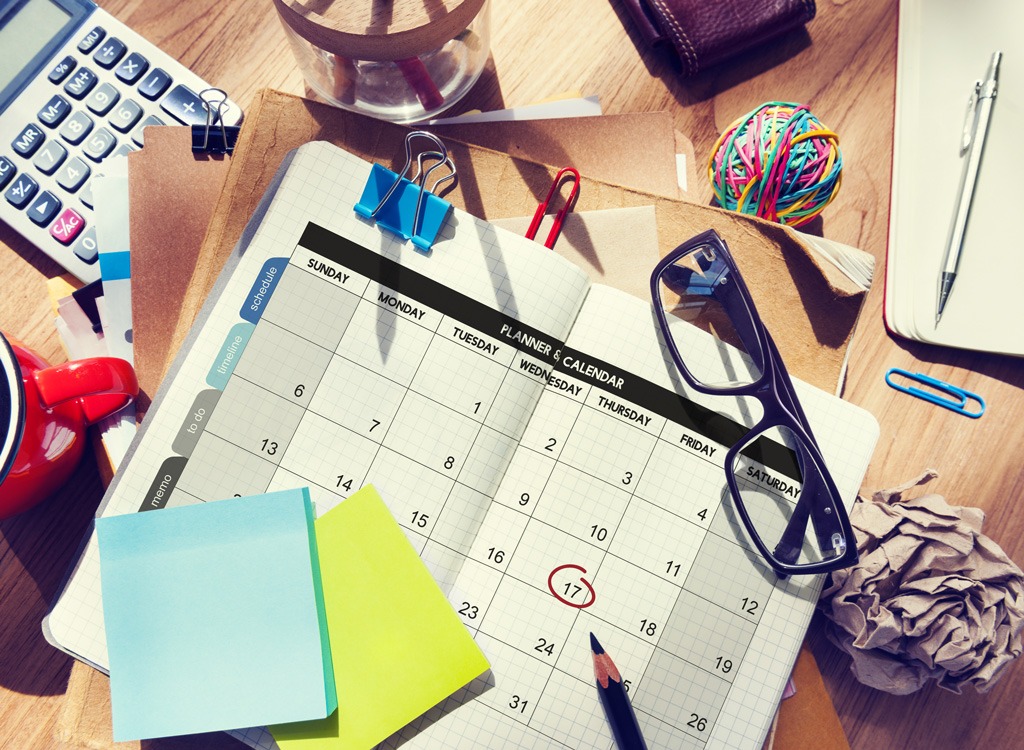
We’ve all been there. You come home too late and you’re way too exhausted to deal with dinner. Nine times out of ten, the solution is either ordering in or heating up a frozen pizza. The problems with those solutions are that the average take-out meal can climb to well over 1,000 calories and frozen pizza isn’t the well-balanced diet meal of your dreams. That’s why it’s important to come up with a meal plan. You can even let us do it! Our 1-week healthy meal plan) shows you just how easy it is to prep in advance. That way, you can always have ready-to-eat healthy foods to turn to when time is tight, hunger is high, and your energy is low.
You listen to music while eating
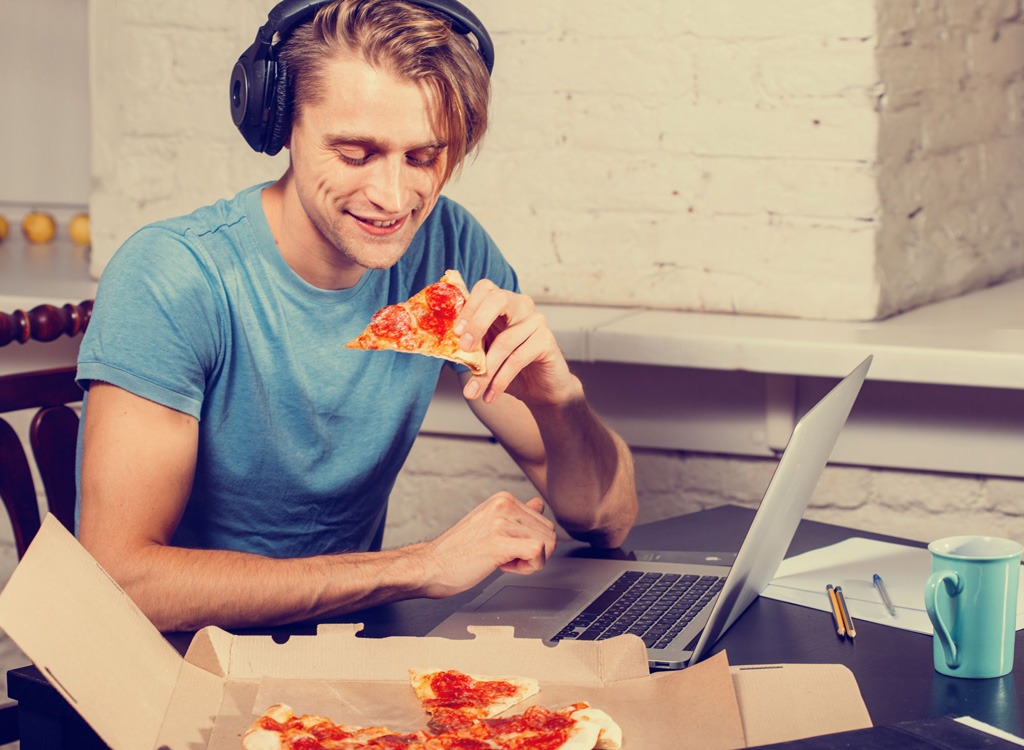
It’s time to put an end to TV dinners once and for all. According to a Food Quality and Preference study, people who listened to music with headphones while eating consumed significantly more of the exact same food compared to those who weren’t jamming out.
You always have a nightcap
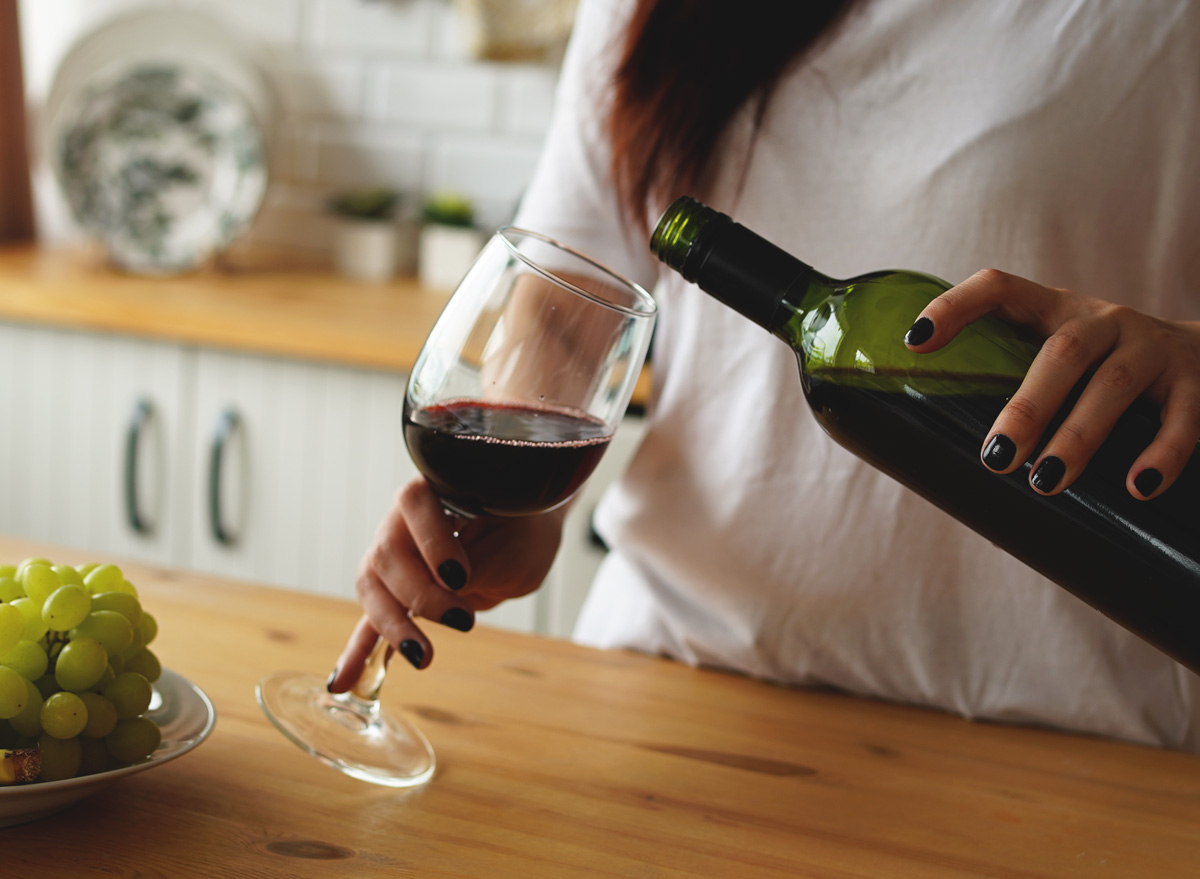
Alcohol can make you drowsy, but it inhibits your ability to get quality deep sleep later at night. Ideally, don’t have any drinks 90 to 120 minutes before bedtime. This will allow enough time for your body to metabolize alcohol before your body transitions into the deep stages of sleep.
You beeline to the add-in station at your coffee shop

If your coffee tastes like ice cream, you’re doing it wrong. Adding packet upon packet of sugar will ultimately cause your blood sugar to spike and crash—which makes you crave unhealthy food—and can ultimately lead to weight gain. And it’s not just sugar you have to be worried about if you’re looking to save calories. According to a 2017 study published in the journal Public Health, researchers found that nearly 70% of coffee consumers drink coffee with caloric add-ins (including sugar and creamers); out of those people, close to 16% of their daily caloric intake came from sipping on their coffee concoction. That 16% translates to an additional 70 calories a day more than non-coffee drinkers. There are some add-ins that are OK to use—like cinnamon or a splash of almond milk—but just don’t use these 7 Things You Should Never Add to Your Coffee.
